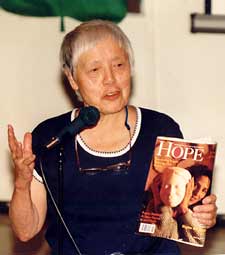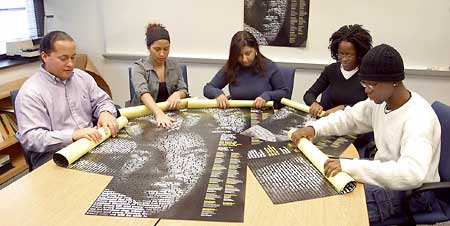
The keynote speaker for the University’s celebration of Martin Luther King Jr. knows that she has a special challenge for her Jan. 20 address. Not only must she incorporate the ideas of King, but also of Mahatma Gandhi.
The theme for the 16th annual symposium honoring King is a quote from Gandhi: “We must be the change we wish to see in the world.” In preparation for her speech, civil rights activist Grace Lee Boggs has thought about those words and has read Gandhi’s writings.
“Even though the theme is we must be what we want to see in the world, we have to think about what it is we want to be before we can be it,” Boggs says. “We have the power to define who we are. We have the ability to make choices.”
Boggs will speak at 10 a.m. Jan. 20 in the Rackham Auditorium, on the busiest day during a month of activities honoring King.
Another prominent speaker during the symposium is bell hooks, a cultural critic, author and feminist theorist. Her talk will be at 4:30 p.m. Jan. 15 in the Ballroom of the Michigan Union, in an event co-sponsored by Information Technology Central Services, the Law Library, the School of Information, University Housing, the University Library and the MLK Symposium Planning Committee. A book signing will follow the speech. (see page 9 for more information on hooks).
Other highlights include:
• The opening speech, 8 p.m. Jan. 13 in the Michigan Union Ballroom, by Ronald Takaki, considered by many as the founder of modern multicultural studies, sponsored by the MLK Symposium Planning Committee;
• The MLK Student Concert: The Black Bottom Collective at 8 p.m. Jan. 19 in the Ballroom of the Michigan League, sponsored by the MLK Symposium Planning Committee. Tickets are $5;
• Annual MLK Day Children’s Program, 8:30 a.m.–2 p.m. Jan. 20 on the first floor of the Modern Languages Building, sponsored by the School of Education and the School of Social Work;
• “Be the Change You Wish to See in the World,” by Dr. Alvin F. Poussiant, at noon Jan. 20 in the Dow Auditorium of the Towsley Medical Center, sponsored by the Health Sciences Program, School of Social Work, School of Nursing, School of Dentistry, Medical School, School of Public Health, College of Pharmacy and the U-M Hospitals and Health Centers;
• “Clinging to the Truth in the 21st Century: What the Legacies of King and Gandhi Offer,” a lecture by Rajmohan Gandhi, at 4 p.m. Jan. 20 in the Schorling Auditorium of the School of Education, sponsored by The Center for South Asian Studies in the South Asia Current Affairs series and the International Institute;
• “On Being Human,” a lecture by Robert Rodriguez and Patrisia Gonzales, at 7 p.m. Jan. 27 in the Ballroom of the Michigan Union, sponsored by the MLK Symposium Planning Committee, the Office of Multi-Ethnic Student Affairs and the Latino Task Force;
• “Cowboy Bush and Indians: Frontier Mentality and Mother Earth,” a lecture by Tom Goldtooth, 6 p.m. Jan. 29 in the Kuenzel Room of the Michigan Union, sponsored by the MLK Symposium Planning Committee, the School of Natural Resources and Environment, and the Native American Student Association.
For a comprehensive list, see the MLK Symposium calendar>.

The committee planning the celebration came up with the theme during the summer and planned the strong lineup around that, says John Matlock, associate vice provost for academic affairs and director of the Office of Academic Multicultural Initiatives (OAMI).
“We’re very proud of it. We have a committee that has worked very hard most of the year to think about activities and programs, and the schools and colleges have worked really hard,” he says.
The committee members were disappointed when the original keynote speaker, Carole Simpson of ABC News, had to cancel, Matlock says. But “we were able to bounce back” by bringing in someone as prominent in the civil rights movement as Boggs, he says.
This year’s theme was selected in part because of the influence Gandhi had on King, says Andrew Adams III, a program associate with OAMI and co-coordinator of the event.
“The theme was definitely chosen to highlight the connection between the two men, but it was also chosen because of how powerful it is,” he says. “A lot of people think they don’t have to worry about what’s happening outside of their home or their family. I think that quote from Gandhi is very powerful.”
One of the main goals for this year’s symposium is to challenge people to look inward, says Silvia Carranza, a program associate with OAMI and co-coordinator of the event. “When we look at our own lives and community, we are better able to make a positive change,” she says. “Grace’s mission and life are an excellent example of how a person can achieve that.”
The planners also hope that students and others attending the events focus on the messages for more than just a day or two.
“It’s a celebration that we hope everyone can find some kind of relationship to, regardless of ethnicity, gender and other defining characteristics,” Carranza says. “This is one day to reflect on MLK’s influence and purpose and be able to relate it to our own.”
“I think the message to our students is, when it comes to change, when it comes to activism—you have to make a lifelong commitment to it,” Matlock says. “When you think of Dr. King, and of Dr. Boggs, these are people who made lifelong commitments. That’s the most important thing.”

